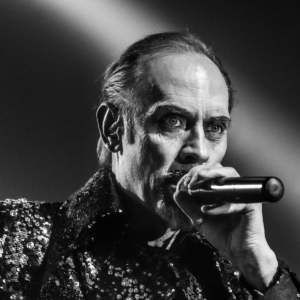John Lydon: ‘My independence worked against me’

John Lydon may have mellowed a bit, but Rock and Roll Hall of Fame organisers in the States discovered a few years back he could still deliver a diatribe of filth and fury when provoked. After they tried to induct the former Rotten and his Sex Pistol colleagues into their circle, he fired off a hand-written fax to them, explaining in no uncertain terms their hall of fame was “a piss stain” and their museum “urine in wine”.
“We’re not coming. We’re not your monkeys,” the fax screamed as he ripped into them for attempting to charge $25,000 for a table or $15,000 “to squeak up in the gallery”.
Anyone who saw Lydon in the company of US rights organisation BMI at its annual London gatherings last month might have thought they were casting their eyes on an altogether different chap. The man who three-and-a-half decades ago reportedly had Middle Englanders behind their twitching net curtains fearing for their safety was all humble and emotional as he was introduced by BMI’s top suit Del Bryant and then explained why he was so chuffed to be getting an Icon Award for songwriting from the society.
“I do none of it,” he said about awards events. “I can hardly bear it. I’m just the shyest bloke you could ever know. I can’t handle it. It’s hard. I’ve been working for now – what – 35 years. No one has ever given me a compliment. I’ve always been seen as the problem. I don’t think I am. I think I’m part of the solution.”
But in case you thought the old Lydon had really disappeared he did manage to call Bryant ‘Del Boy’ throughout the proceedings – and when the BMI president said he was going to tell him what the award inscription said he interjected with the suggestion that he might just read “cunt”.
In an interview later with Music Week the punk legend takes up the theme again about why this particular award means so much to him, noting that – unlike other ones he has been offered over the years and refused – it comes from a songwriter’s point of view.
“That’s what I do,” says Lydon who gave a demonstration of his art at the US society’s London dinner and awards with a brief rendition of the Sex Pistols’ EMI with an appropriate lyric change to “B-M-I” – but lacking the original’s venom. “They understand what it is I do, that I don’t tell a lie and I write. It’s the whole truth and nothing but. I’ve been given a wonderful opportunity in my life. From day one in the Sex Pistols onwards it’s always been the truth.
“I grew up reading and writing. I could read and write at four; my mother taught me. What do I love about books? I love the writer telling me the truth from their point of view. This is how we learn. This is how we should be: transparent to each other, warts and all. This is how I write with that kind of sensibility. This is a boy who lost his memory at seven and had to look at himself.”
For much of the public their most recent sightings of Lydon would have been the likes of a brief appearance in ITV’s I’m A Celebrity and more recently him being the unlikely star of a TV ad for Country Life Butter. Of course, that sparked cries of “sell out”, but when has he ever taken notice of what the critics think? And, besides, the ad ended up given him the financial foundations to relaunch Public Image Ltd, the band that followed the Sex Pistols.
“It worked out that way,” he says of the commercial raising money to revive the group. “It wasn’t done for that. That was done because Rambo my best mate since 11 [and now manager] goes, ‘This’ll be a laugh.’ I didn’t think it would ever work, didn’t think there would be any money in it. There wasn’t great money. I’ll be blatant with you there. Again there are always rip-offs, but it was enough to get some money put against the record company debt and that opened some really interesting novel ideas about booking the rehearsal and ringing up some proper people I’ve worked with in PiL over the years and that’s Lu, Bruce and we needed a bass player that wasn’t going to charge an extravagant, over-the-top price.”
He recalls when he originally started PiL, having unceremoniously quit the Pistols at the end of their ill-fated US tour in 1978, he had always wanted it to be “an equal opportunities thing”. But according to him: “I already had a reputation going on and the new band members they just wanted me to pay for everything and that more or less bankrupted me. These cheeky mother fuckers are out there to this day bad mouthing me but haven’t put a penny into PiL.”
PiL’s return album, This is PiL, came out in May 2012 and was released on the band’s own PiL Official label, giving him the kind of independence he could never have achieved in all the years at Virgin Records, firstly with the Sex Pistols, then PiL and his own solo projects.
“Well, I’ve always claimed independence, but that sense of independence I had worked against me,” he says. “The record companies went very negative with that, yet signed endless bands – Smashing Pumpkins – that would imitate the formats I was setting. It was heart-breaking to have to endure that and then the press out there were given a field day to slag me off because I had no record company support. So when I got into the Pistols I got the Rupert Murdoch shit. Then I start PiL and I get no record company support, music press vendetta nonsense. But it’s made me what I am so I am very beautifully grateful.”
Lydon explains, even when he was signed to a traditional record company, in his own head he thought he had total control over what he was doing, but in reality all he was doing was “getting further and further in debt”.
“I began with the Sex Pistol contract, which was very poorly negotiated right from the start. God bless Malcolm [McLaren] and all his fantastic ideas, but he had no brains for business and neither did any of us. I found myself mid-Eighties running two bankrupt bands at the same time. What an achievement! And still to this day the Pistols when we did the ’96 tour we thought it was going to be great. No, it raised so much financial ruin. All these lawyers and accountants came out of the woodwork and all these clauses started to rear their ugly head and it just got impossible.”
Since then Universal has taken control of the group’s recorded back catalogue in a 2012 deal pre-dating it completing the takeover of Virgin Records owner EMI. Lydon describes the purchase of his group’s work by the major as “wonderful”, although he did publicly protest about it launching a campaign last year to try to get God Save The Queen to No 1 in the week of the Diamond Jubilee. It failed miserably, rising only as high as No 80 on the Official UK singles chart as the likes of Gary Barlow, Jessie J, Paul McCartney and Madness gathered in front of Buckingham Palace for a concert to salute Her Majesty.
“I was all for that,” he says of the Universal deal, “and I’m not sure how that will unwind, but it was a way from an initial problem. They bought a debt obviously, but it’s fresh faces. There’s a point where you can’t go on any longer in this coalmine.”
But he is less certain about what he makes of Universal then going on to buy EMI, the beloved UK record company whom he so famously sang about 36 years ago and who released the Sex Pistols’ first single Anarchy In The UK but then dropped them following the furore surrounding their “Bill Grundy moment”.
“I’m not quite sure all of this is going to balance well in the books inside my head,” he reckons. “The problem for me is I still have friends because of the way I am and personal attachment with all of those record deals. I can’t slag the record company off total. I can quite easy do that with the accounts department, but not the personalities that were ever so helpful. There was something really, really terrific about what a record company was offering a new band in those early days. It didn’t mean ‘Here’s a load of money, go and have a party.’ It meant somebody was talking to you as a human being and caring about what you did and wanted to be involved.”
Although supportive of it, he is also quick to explain the catalogue deal with Universal “wasn’t my idea” and he finds himself in a situation with him on one side and the other Pistols represented by a manager on the other.
“You see with the Pistols you have to understand there’s three other people who are connected with a management called Anita Camarata who I cannot stand. To me she’s the antithesis of everything I hold dear in life. Her attitude is, ‘Let’s turn it into kiss and make some money.’ I can see Steve [Jones], Paul [Cook], Glen [Matlock] they like that. They’ve always seen the Pistols in that way so I was always the problem. To this day, yeah, I am the problem.”
His exit from the group and then what happened still sit very uncomfortably with him with Sid Vicious, his long-time friend, shoved centre stage and a series of singles put out desperately lacking Lydon’s personality and creative input.
“Fuck you. Try and write a song without me,” blasts Lydon, who is published by Warner/Chappell. “They had their go. It’s called The [Great] Rock ‘n’ Roll Swindle. Friggin’ In The Riggin’ was an even better one. It makes you understand how hurtful listening to that was for me at the time and painful because I thought I’d written some really fucking serious stuff and I cared about what I wrote and I still do.”
He agreed it pissed on the group’s legacy, but he does not blame the other band members nor even McLaren, who passed away aged 64 in 2010.
“[It was the] conglomerate of all of it put together, this headless chicken and go for gold and try to wrap it around poor old Sid, my mate, who was at the time riddled with drug problems and the Nancy situation. It was like a concrete inner tube wrapped round his neck and how could he cope with that? They dug a deeper and deeper hole for the poor sod and Sid, my fault, I bought him into the band. I feel a sense of guilt. I pushed, dragged him, however you want to look at it, into a band he was ill-equipped to cope with mentally. He was my friend. I’ll love him forever. He knows that, but he couldn’t cope with that. Half-way during his career in the Pistols we all realised he had no sense of timing, [was] tone deaf, [had] no sense of rhythm.”
But he did look the part.
“Oddly enough, that seemed to have been good enough. How perfect. Sid found at least one thing and you’ve got to have to love him for that, but I feel the pain of his inadequacy, which is why he jumped into the heroin you see. That’s what heroin does. It covers up inadequacies and Malcolm was there with the money to take care of that.”
Even all these years later Lydon still finds he is having to deal with a reputation that he believes is unjustified – him supposedly being “the problem” as he would put it. That includes when playing live an expectation in organisers’ minds he is going to let them down in some way.
As Lydon, who played Glastonbury with PiL this summer, notes: “It’s ridiculous, all the things I’ve done for, what, 35 years now and I still have to prove to promoters and festivals that it’s not the filth and fury. They still think I won’t turn up, yet there is no history of me not turning up ever for anything. You’d have to break both legs, snap off my arms. It’s like that Monty Python thing. That’s how I am.”
Source: Music Week


